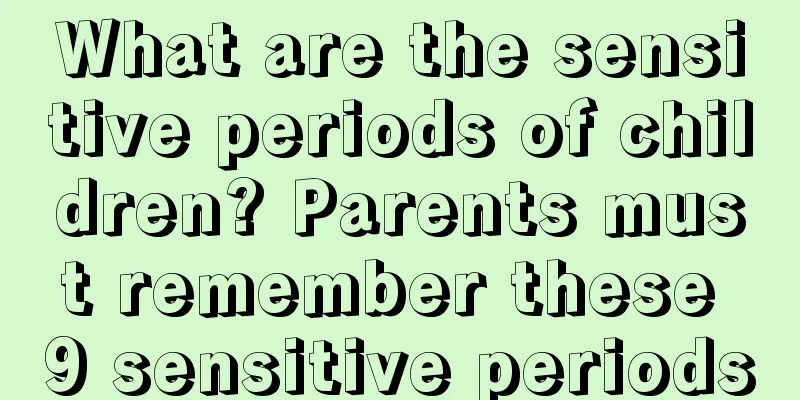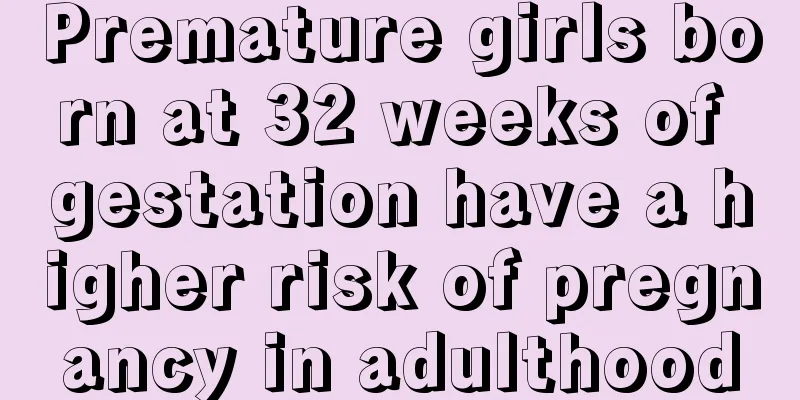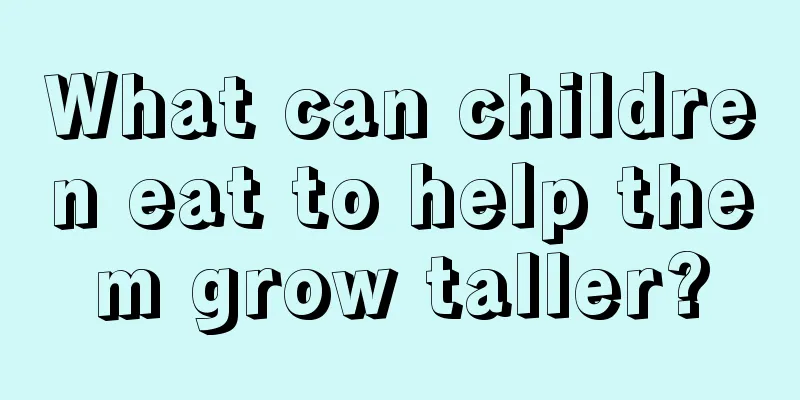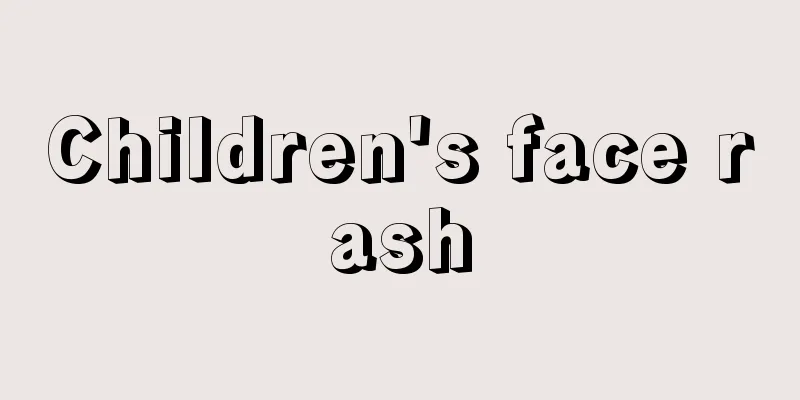What are the sensitive periods of children? Parents must remember these 9 sensitive periods

|
A child’s sensitive period is also the best time for them to learn by observing the external environment. Therefore, it is very helpful for their growth and development to understand when their sensitive period is and to teach them in a targeted manner during this period. In fact, there are 9 sensitive periods for children, and parents must remember them! A language sensitive period Range: 0 to 6 years. When a baby begins to look at the shape of an adult's mouth when speaking and makes babbling sounds, his language sensitivity period begins. Learning a language is a difficult task for adults, but young children can easily learn their mother tongue because they have a natural sensitivity to language. Therefore, if a child is still slow to speak at around two years old, the child should be taken to the hospital for examination to see if there is any congenital disorder. Language ability affects children's ability to express themselves. Therefore, parents should talk to their children frequently, tell them stories, or use "rhetorical questions" to strengthen their children's ability to express themselves and lay a good foundation for their future interpersonal relationships. Second order sensitive period Range: 2 to 4 years. Children need an orderly environment to help them understand things and become familiar with the environment. Once the familiar environment disappears, he will be at a loss. During her observations, Montessori found that children would become afraid, cry, or even lose their temper when they were unable to adapt to the environment. Therefore, determining the "demand for order" is a very obvious sensitivity of young children. Young children's sensitivity to order is often manifested in their requirements for sequence, living habits, and possessions. Montessori believes that if adults fail to provide an orderly environment, children will "lack a foundation for establishing a perception of various relationships." When children gradually establish an internal order from the environment, intelligence is also gradually constructed. Three sensory sensitivity periods Range: 0 to 6 years. From birth, children use their senses such as hearing, vision, taste, and touch to become familiar with the environment and understand things. Before the age of three, children absorb things around them through their subconscious "absorbent mind". Children aged 31 to 6 are more able to analyze and judge things in the environment through their senses. Therefore, Montessori designed many sensory teaching aids, such as. Hearing tubes, tactile boards, etc. are used to sharpen children's senses and guide them to generate their own wisdom. You can also prepare a variety of sensory teaching materials at home, or randomly guide your children to use their five senses to feel the things around them in life. Especially when children are full of desire to explore, their needs should be met as much as possible as long as they are not dangerous or do not infringe on others' property. 4. Sensitive period of interest in subtle things (1.5 to 4 years old) Busy adults often ignore the small things in their surroundings, but children can often capture the mysteries. So if your child becomes interested in tiny insects in the dirt or the tiny patterns on your clothes, it's time to cultivate your child's meticulous attention to detail. Five motor sensitive periods Range: 0 to 6 years old. Children aged two can already walk and are the most active and lively period. Parents should allow their children to exercise sufficiently so that their body movements are correct and skillful, and help the left and right brain develop in a balanced way. In addition to large muscle training, Montessori places more emphasis on small muscle training, that is, the education of subtle movements of hand-eye coordination, which can not only cultivate good motor habits, but also help the development of intelligence. Six Social Norm Sensitive Periods Range: 2.5 to 6 years. Two and a half year old children gradually become less self-centered and have a clear tendency to make friends and participate in group activities. At this time, parents should establish clear living norms and daily etiquette with their children so that they can abide by social norms and have a self-disciplined life in the future. Seven sensitive periods of writing Range: 3.5 to 4.5 years. 8. Sensitive period for reading Range: 4.5 to 5.5 years. Although children's writing and reading abilities develop later, if they receive sufficient learning during the sensitive period of language, senses, body movements, etc., their writing and reading abilities will develop naturally. At this time, parents can choose more reading materials and create a bookish home environment, which can help children develop a good habit of reading and become a knowledgeable person. 9. Cultural Sensitive Period Range: 6 to 9 years. Montessori pointed out that children's interest in cultural learning begins at the age of three, but by the age of six to nineteen, they have a strong desire to explore things. Therefore, during this period, "the child's mind is like a fertile field, ready to receive a lot of cultural seeds." Adults can provide rich cultural information at this time, based on local culture, and extend it to a broad mind that cares about the world. |
<<: How to quickly relieve the pain of tooth decay in children, these pain relief tips
>>: What is the cause of blood in children's stool?
Recommend
What are the disadvantages of children being angry?
Nowadays, children basically grow up under the do...
Why does my child always have nosebleeds? The reasons are very complicated
If a child has nosebleeds for a long time, it may...
What to do if your baby has repeated fever
It is a common situation for babies to have repea...
What to do if your baby has poor memory
Many mothers are worried about their children'...
Can a one-year-old baby eat kelp?
There are many things to pay attention to when it...
What kind of complementary food can a six-month-old baby eat?
Six-month-old babies are already very big, so com...
What should children eat to be good for their eyes? Eat more fish and vitamins
Children's myopia has become more and more se...
What should I do if my child accidentally eats mosquito coils?
Children's health issues have always been a c...
What should children eat to grow taller after menstruation?
I believe that many female friends would worry ab...
How to treat asthma in children?
As parents, we all hope that our children can gro...
There is also a good way to treat children's foreskin being too long
After a child is born, parents should take the ch...
What can children eat to cure dry cough quickly?
Dry cough in children is quite harmful and is oft...
What are the benefits of eating kiwi fruit for babies?
The kiwi fruit is juicy, fragrant and delicious, ...
What’s wrong with my 3 month old baby drooling?
When the baby is 3 months old, he will drool ever...
What are the requirements for baby silver bracelets
There has always been a folk custom of giving sil...









